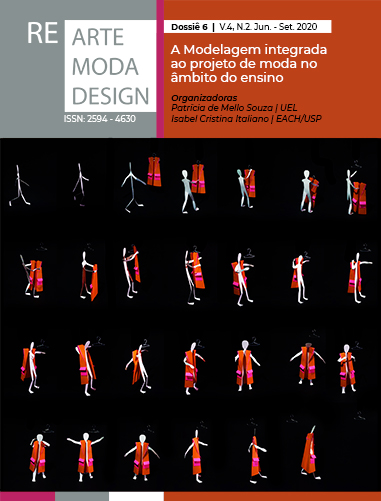From technique to higher education: a look at training in Fashion in Southeast Brazil
DOI:
https://doi.org/10.5965/25944630422020135Keywords:
higher education , fashion , curriculumAbstract
Higher education in Fashion Design began in Brazil around the 1990s. Initially offered by the private sector, at a time of increasing urbanization, industrialization and demands from market sectors. The central concern of this article is to reflect on the constitution, at a higher level, of the formation in Fashion in Brazil, from a section of the Southeast region and to show, through analyzes that involve a look at the curricular matrices of these courses, as well as on historical and social aspects, the causes and objectives of transposing traditionally technical training to higher education. For this analysis, a survey was conducted on secondary data on the social phenomenon of fashion and the expansion policies of Brazilian higher education, as well as the curri- cular matrices of bachelor’s degrees and technological courses in Fashion, in public and private institutions in the country.
Downloads
References
BOURDIEU, Pierre. “Alta-costura e alta-cultura”. Questões de Sociologia. Rio de Janeiro: Marco Zero, 1983.
BRAUDEL, Fernand. “O supérfluo e o costumeiro: o habitat, o vestuário e a moda”. Civilização material, economia e capitalismo, séculos XV-XVIII. v. 1. As Estruturas do Cotidiano: o Possível e o Impossível. São Paulo: Martins Fontes, 1995.
CALANCA, Daniela. História social da moda. Trad. Renata Ambrósio. São Paulo: Editora SENAC, 2008.
DENIPOTI, Cláudio. “A cidade e as roupas: moda e vestuário em imagens fotográficas”. In: FUNARI, Pedro Paulo Abreu (Org.). Arqueologia histórica e cultura material. Campinas: Unicamp, IFCH, 1998.
DULCI, Luciana Crivellari. Moda e modas no vestuário: da teoria clássica ao pluralismo do tempo presente. Rev. Hist. (São Paulo), São Paulo , n. 178, a05817, 2019 . Disponível em: <http://www.scielo.br/scielo.php?script=sci_arttext&pid=S0034-83092019000100601&lng=en&nrm=iso>. Acesso 22/10/2019. Epub July 01, 2019. http://dx.doi.org/10.11606/issn.2316-9141.rh.2019.137649.
ELIAS, Norbert. O Processo Civilizador. 2 v. Rio de Janeiro: Zahar, 1990/1993.
FRANCO, Maria Estela Dal Pai. Expansão do ensino superior no Brasil e políticas públicas: desafios para a gestão. 3o Congresso Nacional do Fórum Português de Administração Educacional. Anais “O Governo das Escolas: Os novos Referenciais, as Práticas e a Formação”. Lisboa, Universidade de Lisboa, 12-14 de abril de 2007.
HEINZ, Peter. “La moda como fenómeno social”. Curso de Sociologia. Editorial Universitaria de Buenos Aires, 1965.
NACIF, Maria Cristina Volpi. O vestuário como princípio de leitura do mundo. XXIV Simpósio Nacional de História, 2007. Anais da Associação Nacional de História – ANPUH. Disponível em: http://snh2007.anpuh.org/resources/content/anais/Maria%20Cristina%20V%20Nacif.pdf. Acesso em 22/10/2019.
SAMPAIO, Heloisa. O setor privado de ensino superior no Brasil: continuidades e transformações. Revista Ensino Superior. Unicamp. 2011. Disponível em http://www.revistaensinosuperior.gr.unicamp.br/artigos/o-setor-privado-de-ensino-superior-no-brasil-continuidades-e-transformacoes. Acesso em 10/08/2013.
SANT’ANNA, Mara Rúbia. O ensino de história da moda no sul do país. Revista ENSINARMODE, Florianópolis, Vol. 2, N. 2, Junho-Setembro 2018, p. 170-199. DOI: http://dx.doi.org/10.5965/25944630222018170 | ISSN 2594-4630. Disponível em: http://www.revistas.udesc.br/index.php/Ensinarmode/article/viewFile/12379/8446. Acesso em 22/10/2019.
SOUZA, Gilda de Mello. O espírito das roupas: a moda no século dezenove. São Paulo: Companhia das Letras, 1996.
VEBLEN, Thorstein. A Teoria da Classe Ociosa. Os Pensadores. Trad. Olívia Krähenbühl. São Paulo: Abril Cultural, 1980.
Downloads
Published
How to Cite
Issue
Section
License
Copyright (c) 2020 Luciana Crivellari Dulci

This work is licensed under a Creative Commons Attribution 4.0 International License.
- Authors retain copyright and grant the journal the right of first publication, with work simultaneously licensed under the Creative Commons Attribution 4.0 International License, which allows for:
1. Share — copy and redistribute the material in any medium or format for any purpose, even commercially.
2. Adapt — remix, transform, and build upon the material for any purpose, even commercially.
The licensor cannot revoke these freedoms as long as you follow the license terms.Under the following terms:
1. Attribution — You must give appropriate credit, provide a link to the license, and indicate if changes were made. You may do so in any reasonable manner, but not in any way that suggests the licensor endorses you or your use.
2. No additional restrictions — You may not apply legal terms or technological measures that legally restrict others from doing anything the license permits. -
Plagiarism, in all its forms, constitutes unethical publication behavior and is unacceptable. This magazine uses iThenticate similarity control software.






